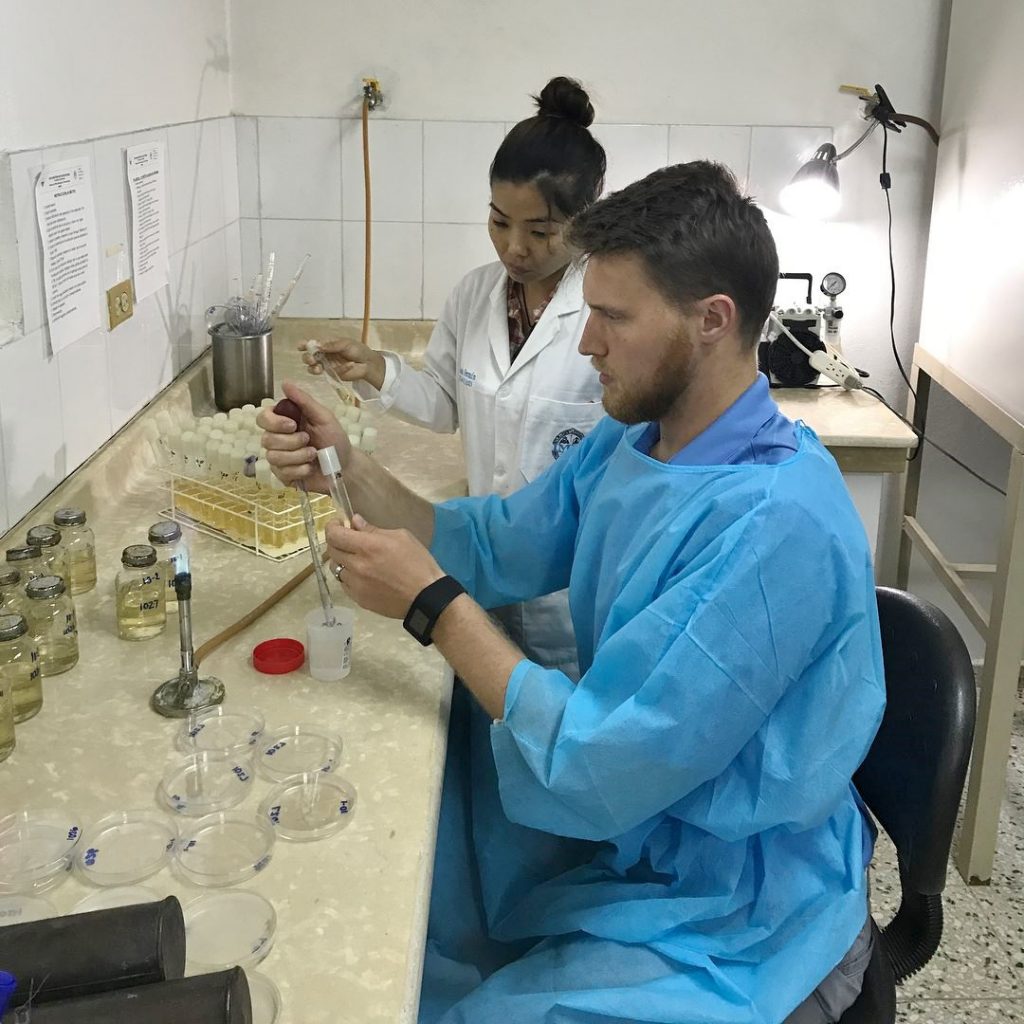Ryan Graydon examines water sustainability in the Dominican Republic
USF College of Public Health graduate student Ryan Graydon is conducting his international field experience in the Dominican Republic with the Institute of Microbiology and Parasitology (IMPA) at the Santo Domingo Independent University (UASD).
Graydon, earning his MPH from the Department of Global Health, said he hopes to identify waterborne pathogens of One Health significance in freshwater sources around the Dominican Republic.

Ryan Graydon, MPH student in the Department of Global Health, and IMPA student Akemi Tabata test water samples using the multiple-tube fermentation technique and the heterotrophic plate count (HPC) to identify total coliforms, fecal coliforms, Escherichia coli, and Pseudomonas aeruginosa. (Photo courtesy of Graydon)
“Living in a country where the tap water cannot be consumed and having to purchase five-gallon jugs for drinking water highlights to me the importance of investing in municipal water systems and protecting our water sources so we can continue to have this life-giving resource for generations to come,” Graydon said.
He’s currently testing water samples for pathogens and mosquitos for Arboviruses like Zika, chikungunya, and dengue.
“My vocational objective is to provide sustainable clean water solutions to any community globally through local empowerment and collaboration,” Graydon said. “This is my goal because of the first-hand experiences I have had witnessing the profound effects that water, sanitation, and hygiene (WASH) can have on individuals and communities while traveling around the world. In 2012, inadequate WASH caused an estimated 842,000 diarrhea deaths globally including 361,000 among children under five years of age. These are preventable deaths and I want to be part of the solution.”

Ryan Graydon shares his special project during a conference in Santo Domingo, Dominican Republic. (Photo courtesy of Graydon)
The Ministry of Higher Education, Science, and Technology (MESCYT) in the Dominican Republic hosted the International Scientific Research Conference on June 8-9 at the Sheraton Hotel Santo Domingo as part of the Dominican Week of Science and Technology.
Close to 1,000 students, researchers, and public officials attended this conference, featuring speakers from around the world.
Special guests included Dr. Aaron Ciehanover, the 2004 co-recipient of the Nobel Peace Prize in Chemistry, and Dr. Foster Agblevor, a researcher from Utah State University Department of Biological Engineering.

Dr. Foster Agblevor (left) and Ryan Graydon in the Dominican Republic (Photo courtesy of Ryan Graydon)
During this conference, Graydon had the opportunity to present his special project, which was based on responses to a survey developed for the Global Health Assessment Strategies graduate course. His research team included Paola Gonzalez, Abdiel Laureano-Rosario, Guillermo Pradieu, and COPH Global Health assistant professor Dr. Jaime Corvin.
“Although I have given poster presentations at previous conferences in Indianapolis, Indiana and Quito, Ecuador, this conference was significant to me because I was chosen to give a 20-minute presentation on my graduate research, which was a first for me,” Graydon said. “The opportunity to present the research I have invested in for over a year to respected researchers from around the world is an invaluable step in my professional development.”

Ryan Graydon at the Congreso Internacional with Dr. Modesto Cruz, director of IMPA. (Photo courtesy of Graydon)
Graydon’s special project consisted of conducting research on the practices and perceptions of tap water and bottled water at USF concluding with recommendations on how to reduce single-use plastic bottles consumption by promoting reusable water bottles.
“I want the public to know that bottled water requires substantially greater resources for a less regulated product than tap water and creates a global plastic waste crisis,” Graydon said. “It makes me terribly sad to walk the shorelines of rivers or the coast here in Santo Domingo and witness a sea of floating plastic bottles and bags that are a disgusting eye sore, choke the marine life, and harm the fishing industry.”
He suggested that although the tap water in the Dominican Republic is unsafe to drink, reusable bottles can be filled at the five-gallon water coolers to reduce single-use water bottle consumption.
“Everyone’s seemingly small action of consuming tap water with a reusable bottle can easily eliminate thousands of plastic bottles from polluting our environment and, as a result, our health,” he said.
Story by Sweta Chalise, USF College of Public Health
